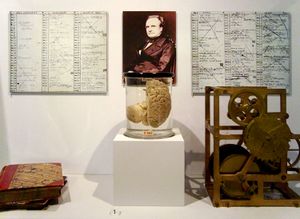Babbage'scher Dämon
Aus Daimon
Alles Gesprochene wird von schwingenden Atomen getragen und überlagert sich chaotisch mit anderen Schwingungen im Raum. Dennoch bilden die Schwingungen ein unvergängliches Archiv alles Gewesenen, indem sie sich in der Vorstellung des englischen Mathematikers und Computerpioniers Charles Babbage (1791–1871) nicht nur in die Atmosphäre, sondern in die gesamte Materie einschreiben. "The pulsation of the air, once set in motion by the human voice, cease not to exist with the sounds to which they gave rise. (...) Every atom, impressed with good and with ill, retains at once motions which philosophers and sages have imparted to it, mixed and combined in ten thousands ways with all that is worthless and base. The air itself is one vast library, on whose pages are for ever written all that man has ever said or woman whispered." Alle Geräusche und ausgesprochenen Worte sind in Atomen gespeichert und bräuchten nur von einem intelligenten Dämon von ihren Überlagerungen befreit zu werden, um Informationen und Beweise aller Art bis hin zur Aufklärung von Verbrechen freizugeben. "When man and all his race shall have disappeared from the face of our planet, ask every particle of air still floating over the unpeopled earth, and it will record the cruel mandate of the tyrant. Interrogate every wave which breaks unimpeded on ten thousand desolate shores, and it will give evidence of the last gurgle of the waters which closed over the head of his dying victim: confront the murderer with every corporeal atom of his immolated slave, and in its still quivering movements he will read the prophet's denunciation of the prophet king."[1]
Babbages Vorstellung klingt bis heute nach und findet sich in abgewandelter Form u.a. in Felix Ebertys Lichtbildarchiv oder in Stanislaw Lems Kyberiade wieder, wo ein Dämon zweiter Ordnung aus dem thermischen Rauschen der Luft vermeintlich sinnvolle Informationen aller Art herausfiltert.
Einzelnachweise
- ↑ Charles Babbage, The ninth Bridgewater Treatise. A Fragment, (second edition) London 1838.
